The importance of celebrating small wins in mental health recovery
Small Victories and Their Power in Mental Health Healing

Understanding the Impact of Celebrating Small Achievements
In the journey of mental health recovery, recognizing and celebrating small wins plays a pivotal role. These seemingly minor achievements can significantly boost motivation, resilience, and overall well-being. This article explores the scientific and practical importance of acknowledging small victories, illustrating how they serve as essential building blocks towards long-term mental health goals.
The Scientific Underpinnings of Celebrating Small Wins
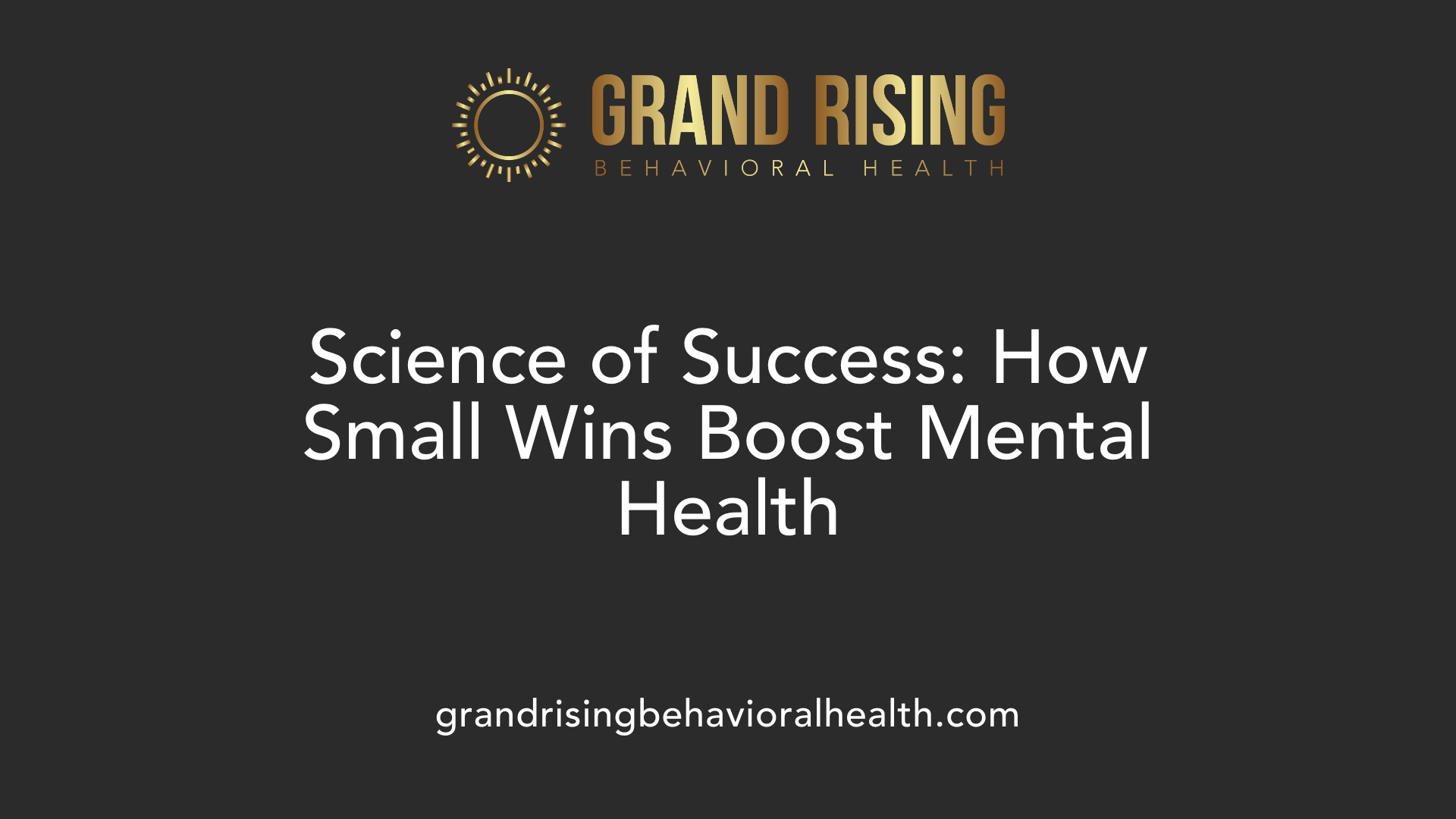
What is the scientific basis for the benefits of celebrating small wins in mental health?
Celebrating small wins activates the brain's reward system by releasing dopamine, a neurotransmitter associated with pleasure, motivation, and reinforcement of positive behaviors. When individuals acknowledge even minor achievements—such as completing a task or practicing self-care—dopamine is released, creating feelings of satisfaction and happiness.
This process helps strengthen neural pathways related to positive actions, encouraging repeat behaviors and fostering a cycle of motivation and success. Over time, these reinforced pathways support improved mood regulation and resilience, making it easier to cope with stress, anxiety, and depression.
Breaking down large goals into smaller, manageable steps provides immediate milestones that generate quick dopamine boosts. Recognizing each small victory offers a sense of mastery, which builds confidence and perseverance.
Furthermore, celebrating these successes fosters mindfulness and gratitude, helping individuals stay present and appreciate their progress. This mindfulness contributes to emotional stability and reduces overwhelm during challenging periods.
Research from the University of Toronto in 2017 highlights that small, achievable goals effectively manage stress and anxiety, as they prevent feelings of being overwhelmed and promote a greater sense of control.
In summary, the scientific basis for the benefits of celebrating small wins involves their capacity to stimulate dopamine release, reinforce positive neural circuits, and bolster psychological resilience. These elements collectively support better emotional health and ongoing motivation in mental health recovery.
Breaking Down Goals for More Achievable Progress
Why is it important to celebrate small steps to big wins?
Celebrating small wins increases motivation and builds momentum. When you acknowledge progress, it boosts confidence and encourages continuing effort, creating a positive feedback loop of achievement.
Breaking large goals into manageable steps makes the journey less overwhelming. For example, instead of aiming to overhaul your entire routine, you might start by waking up at a consistent time or practicing five minutes of mindfulness. These small achievements are easier to accomplish and help you gradually move toward larger ambitions.
This approach is especially beneficial in mental health recovery. It reduces feelings of stress and anxiety associated with big, daunting tasks. Each small success—whether getting out of bed, completing a therapy session, or practicing self-care—serves as a milestone that signifies progress.
Creating momentum is crucial for sustaining effort. Celebrating small achievements, like sticking to a sleep schedule or reaching out for support, reinforces positive behaviors. It helps establish routines that support mental well-being.
A practical method to foster this momentum is maintaining a progress journal. Recording small wins daily or weekly offers tangible proof of advancement. Sharing these achievements with supportive friends adds an extra layer of encouragement.
In turn, recognizing and celebrating these mini milestones nurtures resilience. It cultivates a sense of competence and control, which are vital in managing mental health challenges.
| Strategy | Example | Result |
|---|---|---|
| Breaking goals into smaller steps | Completing one therapy session | Increased confidence |
| Tracking progress | Journaling achievements | Enhanced motivation |
| Rewarding oneself | Enjoying a treat after a milestone | Positive reinforcement |
| Sharing successes | Talking about wins with friends | Strengthened support system |
By focusing on these small, manageable steps, individuals can reduce the feeling of being overwhelmed and steadily work towards bigger goals with confidence. Recognizing each small win not only celebrates progress but also sets the stage for future successes.
Building Confidence and Resilience Through Micro-Achievements
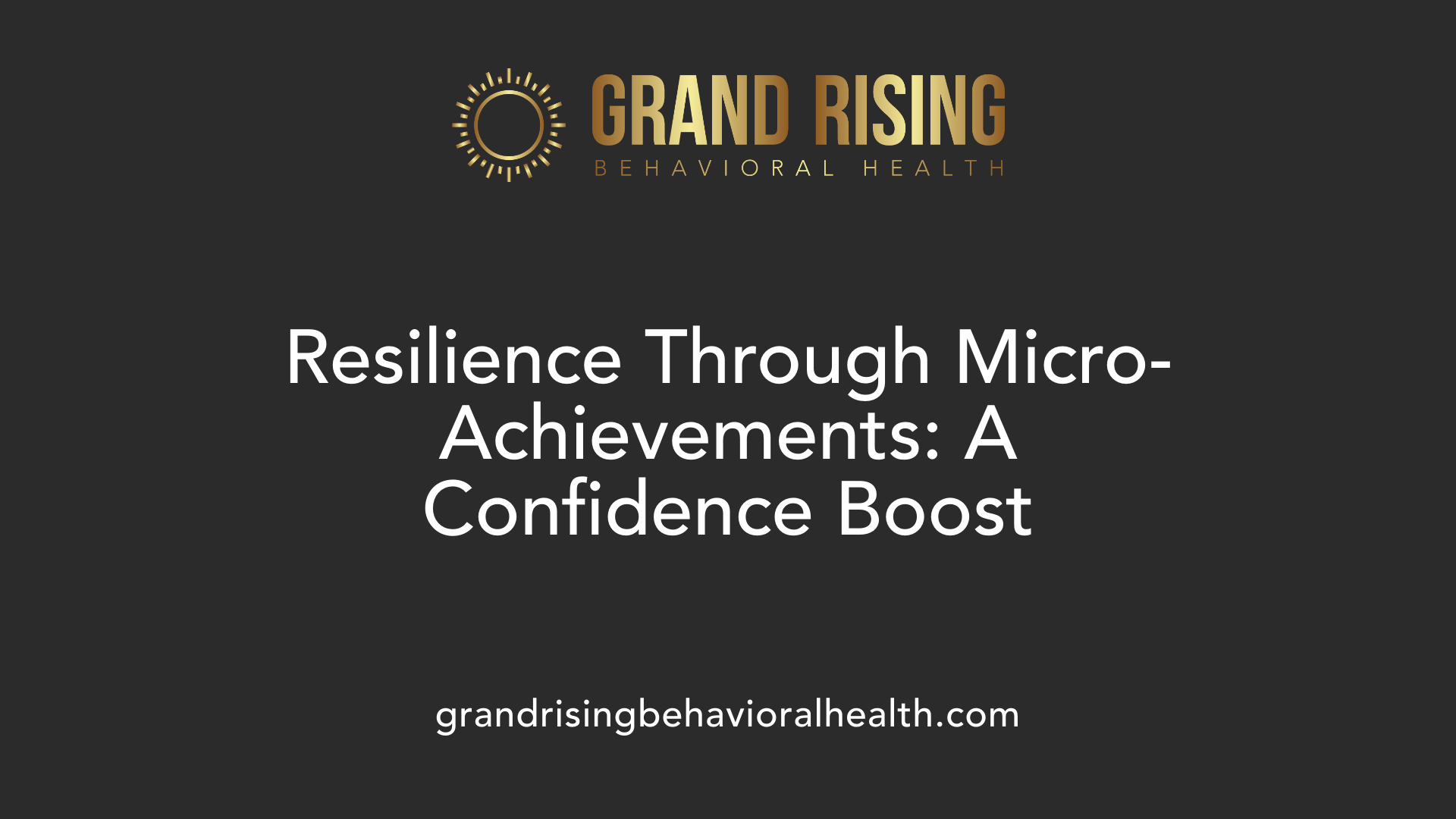
How does celebrating small wins help your mental health?
Celebrating small wins plays a vital role in enhancing mental health by positively impacting mood and confidence. When individuals recognize even minor achievements, it creates a sense of progress, which is especially important for those facing mental health challenges like anxiety or depression.
Each small victory, whether it's getting out of bed, completing a task, or practicing self-care, triggers the release of dopamine, a neurotransmitter associated with pleasure and motivation. This chemical boost helps lift spirits and encourages continued effort.
Acknowledging small successes also strengthens self-esteem by providing tangible evidence of capability. It shifts focus from perceived shortcomings to accomplishments, fostering a sense of control and effectiveness.
Furthermore, celebrating these wins encourages mindfulness by grounding individuals in the present moment. It promotes positive actions and helps prevent feelings of overwhelm.
Overall, this practice fosters a more hopeful outlook, supports emotional regulation, and sustains motivation during difficult times. It constructs a foundation for resilience by reinforcing the belief that progress is possible, even in small steps.
Practical Strategies for Recognizing and Celebrating Progress
What are some practical ways to recognize and celebrate progress during recovery?
Recognizing and celebrating progress in mental health recovery helps sustain motivation and fosters a positive outlook. One effective method is maintaining a recovery journal. By writing down daily achievements, such as practicing self-care, managing triggers, or engaging in therapy, individuals can visibly track their growth over time. Reflecting on these entries reinforces the sense of progress and boosts self-esteem.
Sharing successes with supportive friends, family, or recovery groups can amplify feelings of achievement. Celebrating milestones—like reaching a sobriety anniversary or completing a therapy program—can make accomplishments feel tangible and rewarding. These moments of acknowledgment create a sense of community and reduce feelings of isolation.
Reward systems are another practical approach. Planning small rewards, such as enjoying a favorite activity, taking a relaxing walk, or indulging in self-care routines like a spa day, reinforces positive behaviors. These rewards are particularly meaningful when carefully chosen to promote well-being without triggering setbacks.
Engaging in group activities like gratitude exercises, goal-setting workshops, or mindfulness sessions can also help reinforce progress. Participating in these practices encourages recognition of breakthroughs and fosters resilience.
Ultimately, thoughtful celebrations should be health-focused and personally meaningful. Planning events or rewards that support ongoing recovery efforts will enhance motivation, build confidence, and promote a sustained commitment to mental health goals.
The Role of Small Victories in Habit Formation and Sustained Progress
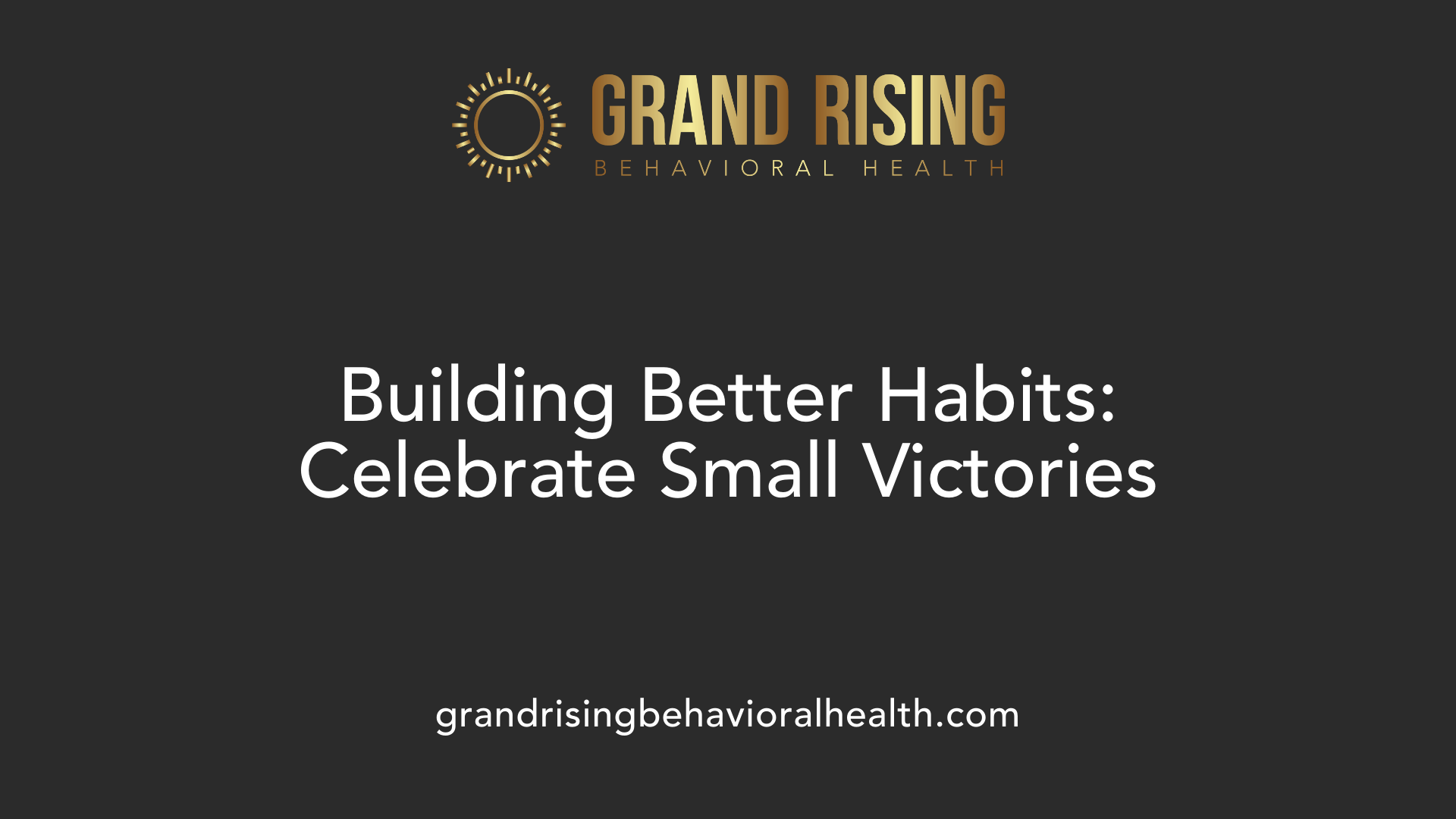
What is the role of small victories in building positive habits and sustaining progress?
Small victories are essential in establishing and maintaining positive habits. They act as immediate signs of accomplishment, triggering a release of dopamine—the brain chemical associated with pleasure and motivation. This chemical boost reinforces the behavior that led to the small win, encouraging individuals to repeat it.
Celebrating these minor successes helps build confidence and self-efficacy, making challenges feel less daunting. As individuals recognize their progress, they develop a growth mindset, understanding that change happens through consistent, manageable steps.
Breaking larger goals into smaller milestones creates a sense of momentum. Achieving these smaller targets sustains motivation, prevents feelings of overwhelm, and prevents burnout. Every small win, whether it's practicing a new skill, maintaining a routine, or completing a task, reinforces the belief that progress is possible.
Focusing on progress also fosters a positive emotional state. It enhances engagement in the process and builds resilience, which is vital when facing setbacks.
Overall, celebrating small wins acts as a catalyst that propels continued effort and turns persistent effort into lasting change, helping individuals develop sustainable habits over time.
Milestones and Reinforcement as Pillars of Recovery
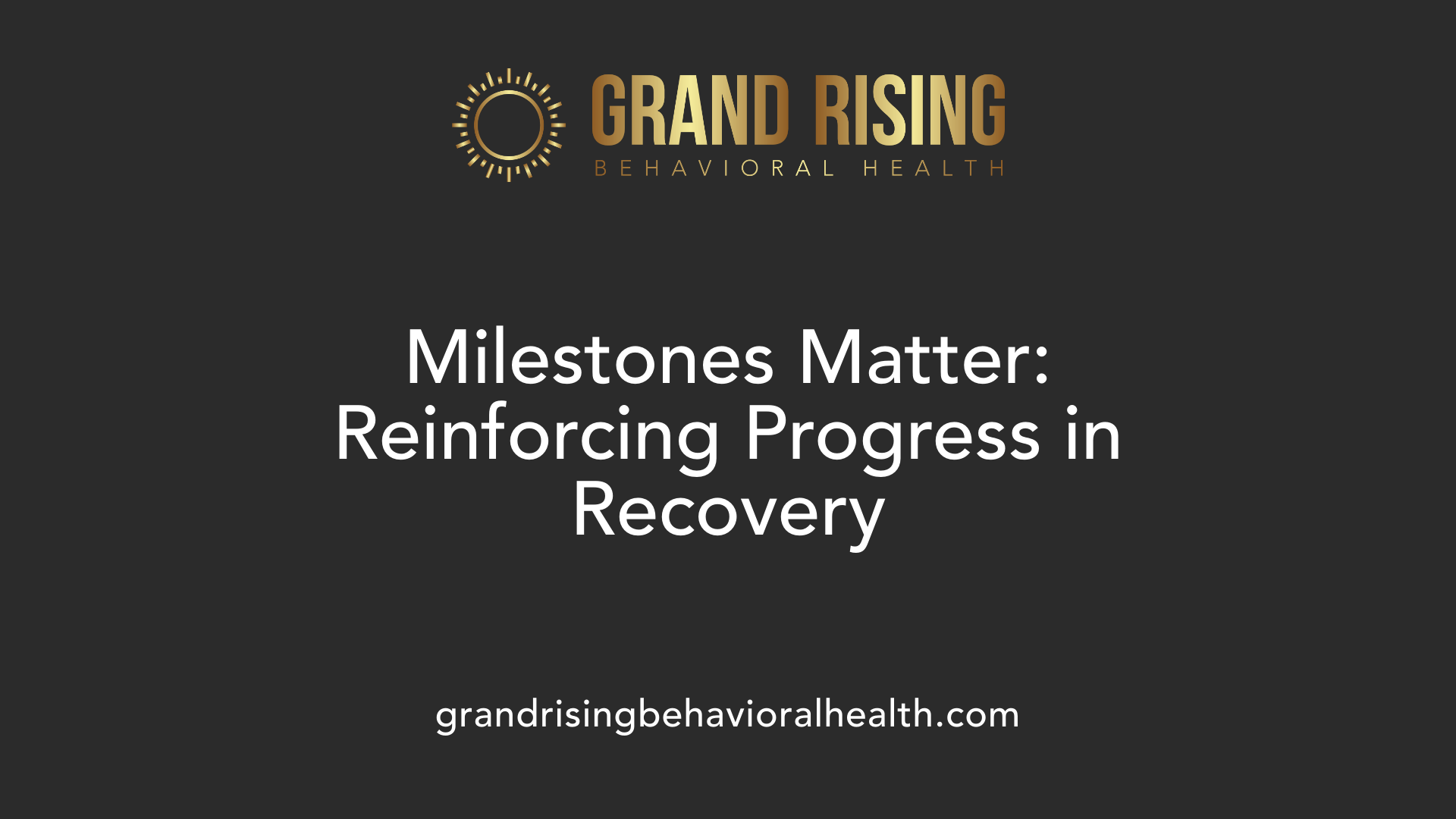
Why are milestones and positive reinforcement important in the recovery process?
Reaching milestones and engaging in positive reinforcement are vital elements in mental health recovery. Milestones, like maintaining sobriety, completing therapy sessions, or establishing daily routines, serve as tangible indicators of progress. Celebrating these achievements provides individuals with a sense of accomplishment and helps reinforce their commitment to healing.
Positive reinforcement techniques, such as rewarding oneself with small treats or recognizing progress publicly, encourage continued effort. These methods activate the brain’s reward system, releasing dopamine—a chemical associated with motivation and feelings of reward. This boost in mood and motivation motivates individuals to keep working towards their recovery goals.
Furthermore, acknowledging milestones increases self-esteem by reminding individuals of their capabilities and resilience. It shifts focus from setbacks or shortcomings to wins, fostering a more optimistic outlook. Consistent reinforcement builds confidence, supports emotional stability, and helps sustain long-term engagement in recovery efforts.
Integrating celebrating milestones and positive reinforcement into the recovery journey creates a supportive environment. It reduces feelings of guilt and shame, nurtures self-compassion, and empowers individuals to believe in their ability to overcome challenges. This approach not only maintains motivation but also strengthens resilience, making the process of healing more manageable and fulfilling.
Educational and Therapeutic Value of Recognizing Small Successes
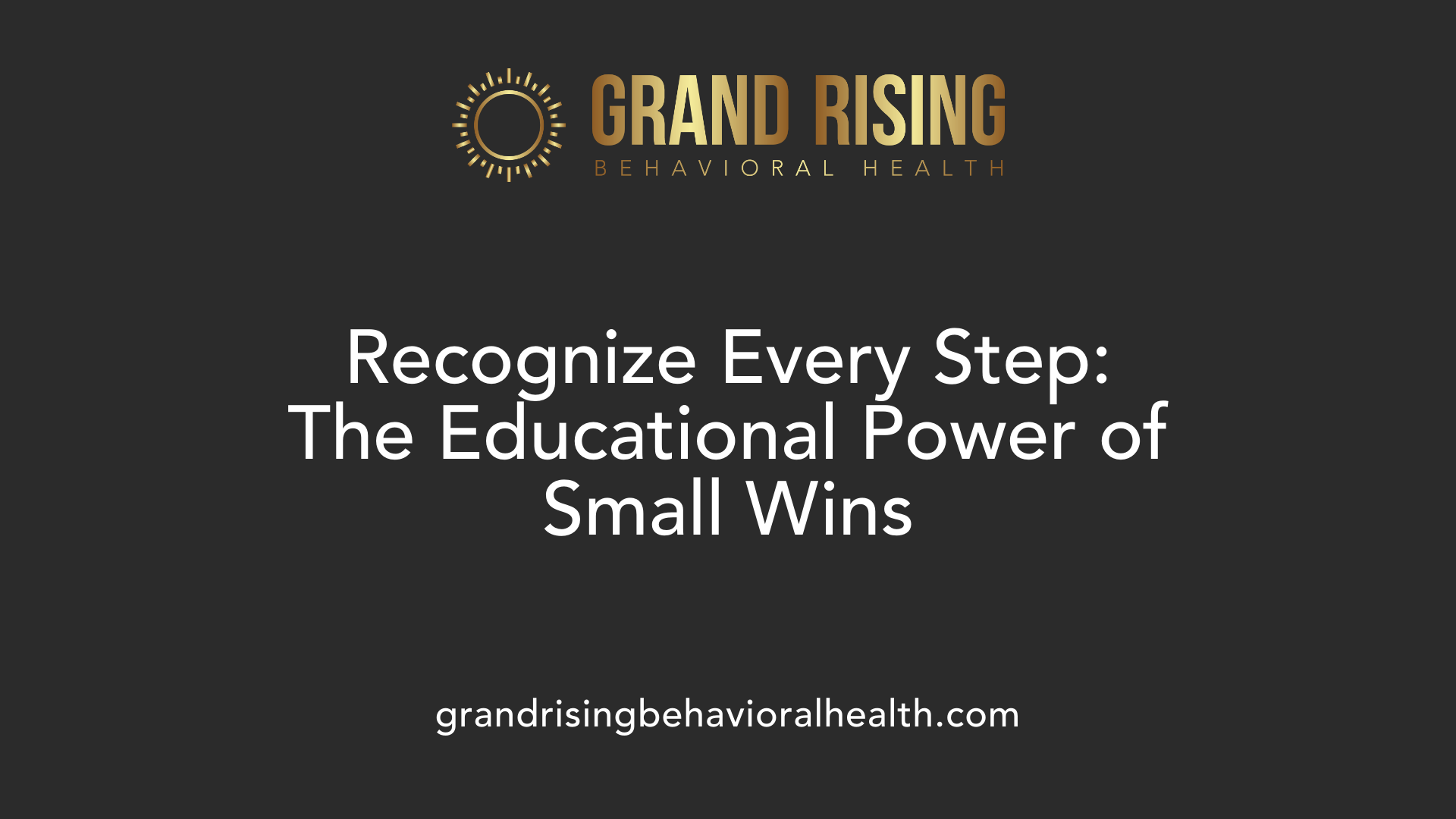
How can acknowledging small successes provide educational value in trauma recovery and mental health therapies?
Recognizing small wins plays a crucial role in education and therapy by reinforcing positive behaviors and encouraging continued efforts. In trauma recovery and mental health treatments, acknowledging these minor achievements—such as practicing self-care routines or managing emotional responses—serves as tangible evidence of progress. This validation boosts individuals' confidence and self-efficacy, ensuring they see their efforts as meaningful and effective.
By highlighting small successes, therapists can strengthen clients’ belief in their ability to recover and manage their condition. It fosters a sense of safety and control, which is essential for building resilience and trust in the healing process.
This acknowledgment also promotes ongoing engagement with therapy. When clients see their improvements—no matter how minor—they are more likely to stay motivated and committed to their treatment plans. Celebrating these milestones creates a positive feedback loop that encourages persistence through challenging phases.
In educational settings, emphasizing small wins helps students and learners understand their own progress. It reduces feelings of helplessness and stigma by showcasing achievable steps, even in difficult circumstances. This approach supports skill development in emotional regulation, coping mechanisms, and resilience.
Overall, the act of recognizing small successes acts as an educational tool that nurtures understanding, boosts motivation, and fosters a proactive attitude towards ongoing recovery and growth.
Fostering a Culture of Recognition and Growth
Celebrating small wins is more than a motivational tactic; it is a foundational approach to sustainable mental health recovery. By actively recognizing even the tiniest steps forward, individuals can reinforce their resilience, develop positive routines, and cultivate a hopeful outlook. Psychological research supports that these micro successes activate neural reward centers, keeping motivation alive during challenging times. Furthermore, incorporating practical strategies such as journaling, sharing successes, and rewarding oneself can make the process empowering and meaningful. As recovery is often non-linear and filled with setbacks, celebrating progress sustains momentum, builds confidence, and creates a supportive environment conducive to lasting change. Embracing the small victories ultimately nurtures a resilient, optimistic mindset that can transform the journey of healing into one of growth, hope, and ongoing self-discovery.
References
- How Celebrating Small Wins Helps Your Mental Health | Rivia Mind
- Celebrating Progress: Recognizing Achievements in Mental Health
- Celebrating Small Wins: Unlock Your Path to Success
- The Power of Small Wins in Mental Health: How Little Victories Build ...
- Honoring Your Progress: Celebrating Small Wins in Trauma Recovery
- Celebrating the Small Wins in Recovery
- From Small Steps to Big Wins: The Importance of Celebrating
- Why Small Victories are Important for Your Mental Health.....and ...
More Resources
A team ready to start your journey.
Get in touch — today.
We are a safe space – a haven for exceptional individuals to receive discreet, personalized, in-person treatment and care.
.avif)










